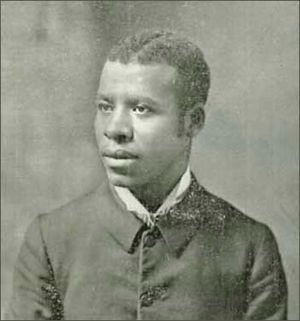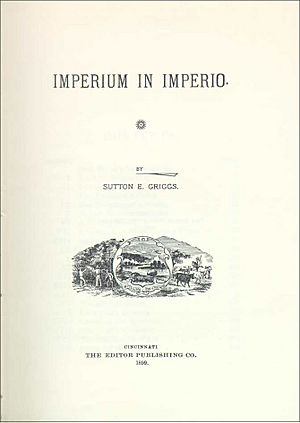Sutton E. Griggs facts for kids
Quick facts for kids
Sutton E. Griggs
|
|
|---|---|

Portrait of Sutton E. Griggs published in 1901
|
|
| Born | June 19, 1872 Chatfield, Texas |
| Died | January 2, 1933 (aged 60) Houston, Texas |
| Occupation | |
| Nationality | American |
| Genre | African American literature, western fiction |
| Subject | Social Justice, Racial Segregation and Integration |
| Notable works | Imperium in Imperio, The Hindered Hand |
| Spouse | Emma Williams |
| Relatives | Allen R. Griggs (father), Emma Hodge Griggs (mother), Eunice Griggs (daughter) |
Sutton Elbert Griggs (born June 19, 1872 – died January 2, 1933) was an important American author, a Baptist minister, and a social activist. He is most famous for his novel Imperium in Imperio. This book imagined a separate African-American state existing within the United States. Griggs was an African-American writer who worked for social justice.
Contents
About Sutton Griggs
His Early Life
Sutton Elbert Griggs was born in 1872 in Chatfield, Texas. His parents were Rev. Allen R. and Emma Hodge Griggs. Sutton was the second of their eight children. His father, Allen R. Griggs, was a former slave from Georgia. He became a well-known Baptist minister. He also started the first Black newspaper and high school in Texas.
Sutton worked closely with his father. They were part of the Education Committee for the National Baptist Convention. Sutton always respected his parents' achievements.
Sutton Griggs went to Bishop College in Marshall, Texas. He also studied at Richmond Theological Seminary. After finishing school, he became a pastor in Berkley, Virginia. In 1897, he married Emma Williams, who was a teacher. In 1899, he moved to East Nashville. There, he became a pastor at Tabernacle Baptist Church. He also helped lead the National Baptist Convention. From 1894 to 1898, Griggs helped start and publish a newspaper called the Virginia Baptist.
His Career as a Writer and Activist
Griggs wrote many books and pamphlets during his life. He wrote more than thirty of them! He often sold his books by going door-to-door or at church meetings. His first novel, Imperium in Imperio, came out in 1899. It became his most famous work.
In 1901, Griggs started the Orion Publishing Company. This company helped sell books to African-American readers. While his other four novels were not as popular, he kept writing. He wrote many books about social and religious topics. He also wrote a book about his own life.
Griggs admired W. E. B. Du Bois, another important African-American leader. He supported groups like the Niagara Movement and the National Association for the Advancement of Colored People (NAACP). Griggs believed that good social behavior could help a community succeed. Some of his ideas, especially in Imperium in Imperio, were quite strong. Because of this, some people saw him as a separatist. This meant they thought he wanted Black people to live separately. However, he also worked for integration and got help from white philanthropy.
In 1923, he wrote a non-fiction book called Guide to Racial Greatness. This book talked about how Black people could improve their lives by working together.
Griggs was very active in both the church and social work. In Houston, he helped create the National Civil and Religious Institute. In 1914, he started the National Public Welfare League. He also served as president of the American Baptist Theological Seminary. His father had helped start this seminary.
Griggs was a pastor at Tabernacle Baptist Church in Memphis for 19 years. He believed churches should help their communities. He made sure his church had the only swimming pool and gym available for African Americans in Memphis at that time.
His Later Years and Legacy
The Wall Street Crash of 1929 was a big economic crisis. It caused the Tabernacle church to lose its money and go bankrupt. Griggs then moved back to Hopewell Baptist Church in Denison, Texas. After that, he had a short time as a pastor in Houston. He died in Houston in 1933 and was buried in Dallas.
Griggs as a Novelist
Griggs's first novel, Imperium in Imperio, tells a powerful story. It follows two childhood friends who grow up very differently. One is more radical, and the other believes in working together. A difficult event brings them together to fight for justice.
The book has a surprising twist: it reveals a secret African-American "empire within an empire." This is like a hidden government with its own Congress in Waco, Texas. One friend, Bernard Belgrave, wants to take over the Texas state government. The other friend, Belton Piedmont, believes in working with others.
Griggs's novels were not known for their fancy writing style. They had long speeches and dramatic moments. However, they were very important for African-American readers. These books gave them a rare chance to read about issues they cared about. These issues included violence, racism, and the fight for fairness.
After his death, many people forgot about his books. But in 1969, Imperium was re-released. This brought new attention to Griggs's work. Now, all five of his novels have been republished. Imperium is now seen as a very important book. It is part of the history of utopian literature, western fiction, and African-American literature.
His Published Works
- Imperium in Imperio: A Study of the Negro Race Problem: A Novel. 1899. — Read the full book online.
- Needs of the South. Nashville, TN: Orion Publishing Co., 1909.
- The Story of My Struggles. Memphis, TN: National Public Welfare League, 1914.
- How to Rise. Memphis, TN: National Public Welfare League, 1915.
- Building Our Own: A Plea for a Parallel Civilization: An address by Sutton E. Griggs. Memphis, TN: National Sentiment Moulding Bureau, n.d. [1920s].
- Meeting the Great Test: Constructive Criticism of the Negro Race. Memphis, TN: National Public Welfare League, 1922.
- Guide to Racial Greatness; or, The Science of Collective Efficiency. Memphis, TN: National Public Welfare League, 1923.
- Kingdom Builders' Manual: Companion Book to Guide to Racial Greatness. Memphis, TN: National Public Welfare League, 1924.
- Triumph of the Simple Virtues; or, The Life Story of John L. Webb. Hot Springs, AR: Messenger Publishing Co., 1926.
- The Winning Policy. Memphis, TN: National Public Welfare League, 1927.
- Basis of Hope for the Negro in the South. Memphis, TN: National Public Welfare League, 1929.
- Plan for Solving the Race Problem. Memphis, TN: National Public Welfare League, 1929.
- Proper Approach to the Race Question in the South. Memphis, TN: National Public Welfare League, 1929.
- The Nation's New Policy Toward the Negro. Memphis, TN: National Public Welfare League, n.d. [1920s].
- Friction Between the Races: Causes and Cure. Memphis, TN: National Public Welfare League, n.d. [1920s].
- Why the Nation Does Not Handle the Race Question. Memphis, TN: National Public Welfare League, n.d. [1920s].


